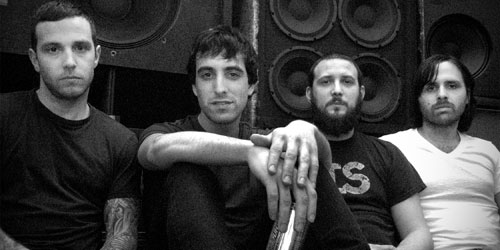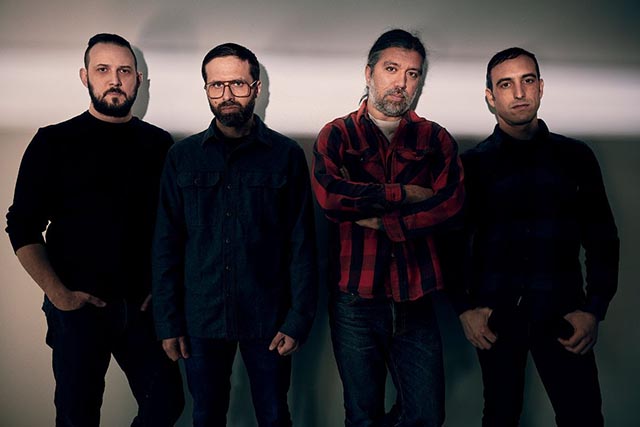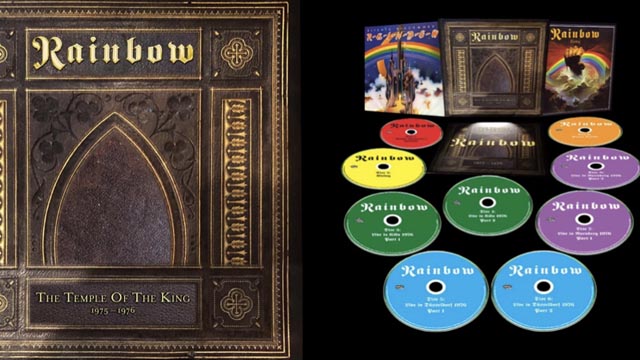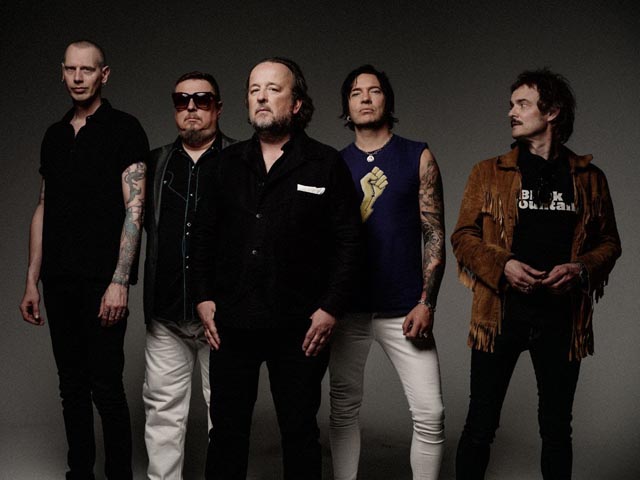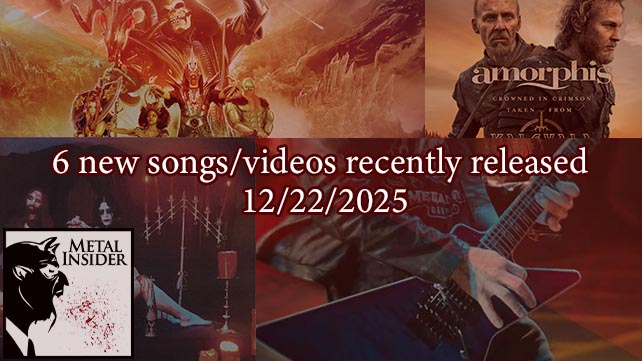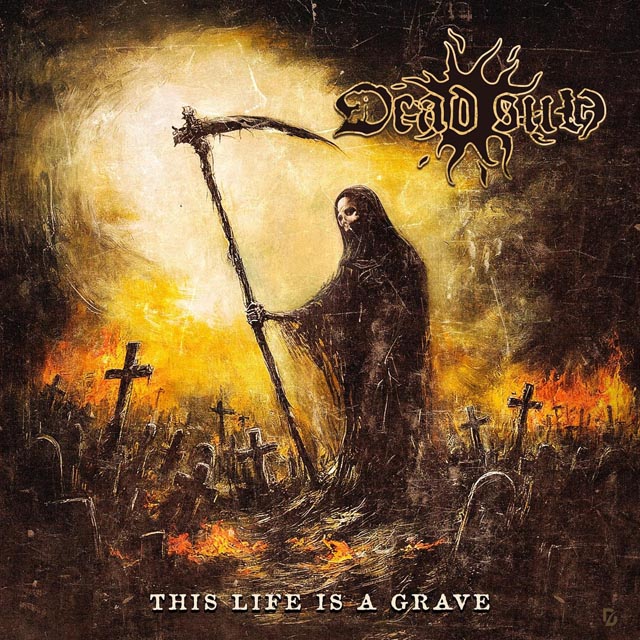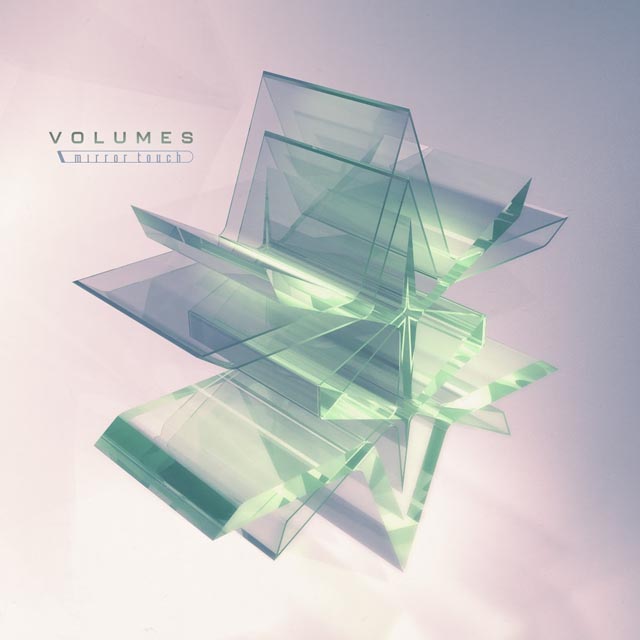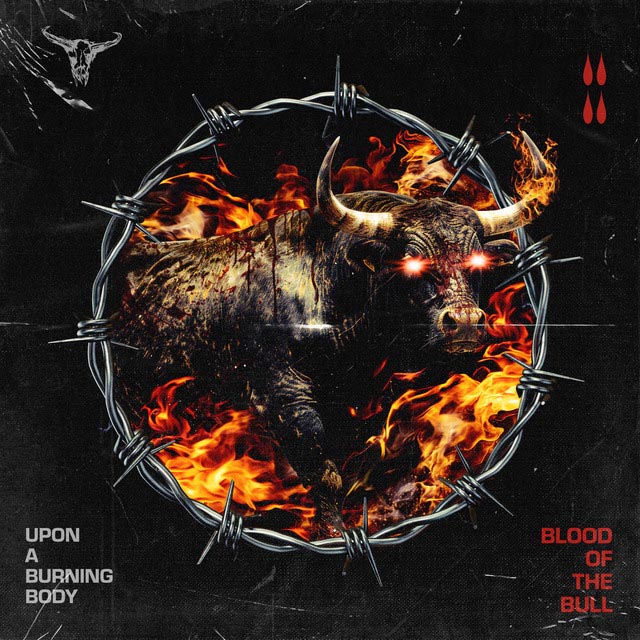 When Decibel came out with their list of the 100 top metal albums of the decade, Cave In’s 2000 offering, Jupiter, came in at #2. It’s not hard to see why. An ambitious album that found the band co-opting their until-then hardcore influence with space rock and, to paraphrase one of the album’s song titles, big riffs. Yet after a major label deal gone sour, and a few more albums, the band took an indefinite hiatus in 2006. Fans were excited when the band reunited for a show in Allston MA this past July, and the band released a four-song vinyl EP, Planets of Old earlier this year that will be released on CD with a DVD containing the Allston concert in January. The band recently wrapped up a four-date tour, and we got a chance to speak to frontman Stephen Brodsky about what led the band to get back together and how things have changed in the decade the band have been releasing music.
When Decibel came out with their list of the 100 top metal albums of the decade, Cave In’s 2000 offering, Jupiter, came in at #2. It’s not hard to see why. An ambitious album that found the band co-opting their until-then hardcore influence with space rock and, to paraphrase one of the album’s song titles, big riffs. Yet after a major label deal gone sour, and a few more albums, the band took an indefinite hiatus in 2006. Fans were excited when the band reunited for a show in Allston MA this past July, and the band released a four-song vinyl EP, Planets of Old earlier this year that will be released on CD with a DVD containing the Allston concert in January. The band recently wrapped up a four-date tour, and we got a chance to speak to frontman Stephen Brodsky about what led the band to get back together and how things have changed in the decade the band have been releasing music.
You just wrapped up a four date tour. Is that the way the band will be touring in the near future?
That’s probably the easiest thing in terms of what’s in the cards, when you consider jobs and families being involved in the picture. It’s fine with us, because I don’t think anyone really wants to go about doing this band in the form of a touring machine like we used to. We’re at the point where we realize Cave In is what it is, in terms of its name and its stature and its position among all the other music out there in the world. We’re comfortable in the niche that we’ve managed to create for ourselves.
What are your future touring plans?
We don’t have any, that’s pretty much it!
Ok then! You went on hiatus in 2006. What led you guys do to record Planets of Old?
The reason we took time off is because we weren’t all living in the same area, and it was impossible to get in a room and function like four human beings playing in a band. Our hiatus ended when we were all living in the same area, and [bassist] Caleb [Scofield] made a few calls to see what everyone’s schedule was.
Did you know the hiatus would result in you getting back together, or was there any point where the future of the band was in doubt?
It was a mix of both. You can never really perceive how people are going to move on with their lives. But it wasn’t a thought that really tortured any of our minds, simply because this band has undergone so many changes, and had a plethora of different adventures of all kinds, in and out of the studio, on and off the road. So if at any point it had to come to an end, we could all look back and say that it was a very fulfilling run.
So now that you’re back together and have recorded an EP, is an album next?
That’s where it’s leaning. There’s certainly a creative urge in the band beyond what we did for Planets of Old. We already have a few full songs in the making. We’re not sure if we want to record a whole album’s worth of songs. My personal opinion on that is that for a band like Cave In that doesn’t have a regular schedule, we do our best to get together once a week to work on new stuff, but with jobs and families, those things tend to come first sometimes. It’s just the natural order of life. I think it would be more beneficial for a band like us to work creatively in shorter bursts. With things like the Internet, I think the faster a band can be, on any creative level, the more you prosper, because people can find things quicker. As an artist, if you can put out music and output quicker, that’s a way to keep up with the times. On the flip side of that, none of us feel like we’re in a rush to complete a project or an album. We have no deadlines hanging over our heads, and I guess we’ll just work at our own pace until we feel pleased enough to give out an offering.
How are you able to handle both Cave In and your other side projects?
It’s definitely a weird juggling act I’ve got going on. With Cave In being in the laid back state these days as opposed to how we used to do the band, ideas and concepts for doing the bands tend to exist more subconsciously than anything. I feel like that’s a collective feeling that goes on. It’s purely a very natural thing – when you’ve got a band for 15 years, it sort of takes on a life of its own and doesn’t need constant attention. So the contrast with other projects that I do, maybe some of the things I’m more involved with outside of the band require a bit more thought and calculation. Sometimes it goes places and sometimes it doesn’t. I will say that Cave In still continues to be the old shoe that fits comfortably every time I put it on.
How do you view the Antenna period, where you were signed to a major label?
It was only 6 or 7 years ago, but in the mind and time frame of a musician, that can seem like light years. At this point, I feel pretty lucky to have been offered the opportunity, and have taken it. We’re all still friends at this point after having come down from the experience of doing our band full time. It’s nice, it’s really given us a perspective on what’s important in the end, which is ultimately satisfying ourselves. Once you employ a larger group of people around your band to do services for you, it’s very easy to get lost from what the original mission statement was. At this point, we can go about our business knowing we don’t need a manager, or a full time lawyer, or a lot of the excesses that come along with the traditional image of being a major label band. It makes the artist stronger not to be so dependent on outsiders and in need of favors. When you couple that with some of the freedom that the Internet is providing for artists, it could be a very interesting future we’re looking at.
How do you feel about the decline in record sales the industry has been going through?
All it means is that there’s less money going around. In some ways, it’s also a reflection of some of the product that was being put out there. People don’t have to buy records to know what they’re getting themselves into. I can rip a record before heading over to a CD shop to purchase it if I want to know how it sounds. On one hand, it’s great for the consumer, in terms of not wasting money on things that you don’t want. The down side is going back to that whole element of mystery, there’s a great deal of that that’s been lost. Photos, videos, music, it’s all readily available at the tips of your fingers, and that element of surprise has gotten lost somewhere along the line. But it’s a transitional time. Sometimes I feel like a dinosaur at the very thought of having gone on tour without a cell phone, or a GPS, or Mapquesting directions to get from show to show.
You played several one-off shows with Coalesce that were presented by Scion. How do you feel about aligning yourself with a corporate sponsor?
Those guys treated the bands really well, and the shows were promoted very well. For a band like Cave In, it made sense. The accommodations were taken care of, and the money was good, and we could afford to leave our families and our jobs, and it was rationalized. We’re not a band that can go out there and play whenever for whoever at any point any more, it’s really got to count. Also, the bill made sense, playing with Coalesce was great, and hanging with them and getting to see them perform again was great. It all just added up, and whether or not they sell extra cars because of it, it really doesn’t affect us one way or the other in the end. We were just happy to get out of the house!


